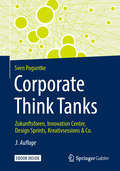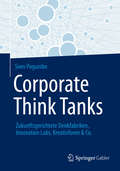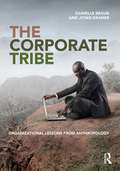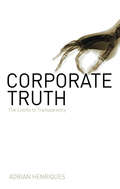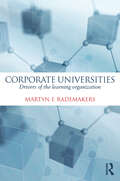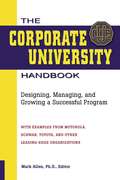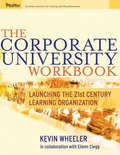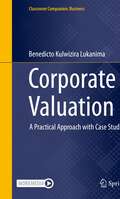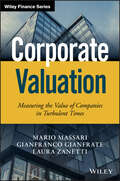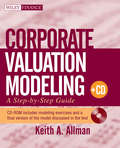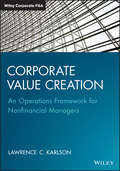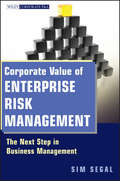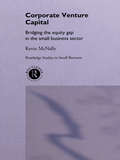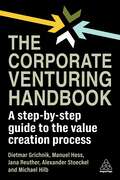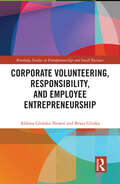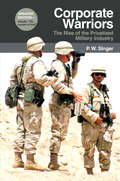- Table View
- List View
Corporate Think Tanks: Zukunftsforen, Innovation Center, Design Sprints, Kreativsessions & Co.
by Sven PoguntkeLesen Sie in diesem Buch, wie Sie Corporate Think Tanks in Ihrem Unternehmen einführen und umsetzenMit diesem Buch halten Sie ein praxisorientiertes Werk zur Einführung und Umsetzung von Think Tanks in Unternehmen in der Hand. Autor Sven Poguntke veranschaulicht ihren Einsatz anhand vieler verschiedener Beispiele aus der Praxis. Diese stammen unter anderem von namhaften Unternehmen wie Google, TUI, Tchibo sowie Procter & Gamble. Außerdem illustriert er anhand vieler innovativer Tools wie ThinkX, Design Thinking, Lego® Serious Play® und Business Model Canvas, wie Unternehmen Corporate Think Tankserfolgreich realisieren.Die Themenschwerpunkte des Buchs „Corporate Think Tanks“ im Überblick• Teil I: Corporate Think Tanks im Kontext zukunftsgerichteter Themen• Teil II: Vorbereitung eines Corporate Think Tanks• Teil III: Durchführung eines Corporate Think Tanks und Ergebnisumsetzung
Corporate Think Tanks: Zukunftsgerichtete Denkfabriken, Innovation Labs, Kreativforen & Co.
by Sven PoguntkeUm neue Konzepte, Strategien und Innovationen zu entwickeln, kommen in Unternehmen immer häufiger sogenannte Think Tanks zum Einsatz. Mit diesen zukunftsgerichteten Denkfabriken soll der kreative Spirit von Start-ups zur Entfaltung gebracht werden. Sie eignen sich sowohl für einzelne Funktionsbereiche und Abteilungen als auch für die Organisation insgesamt. Mithilfe von Think Tanks lassen sich außergewöhnliche und innovative Ergebnisse erzielen – wenn sie gut vorbereitet und zielführend moderiert werden.Spannende Praxisbeispiele von Unternehmen wie Google, Procter & Gamble, Tchibo oder TUI illustrieren den Einsatz von Corporate Think Tanks in der Praxis; ein umfassender Toolkasten zeigt die konkrete Durchführung im eigenen Unternehmen. Neben klassischen Methoden werden auch innovative Tools wie ThinkX, Design Thinking, Lego® Serious Play® oder der Business Model Canvas anschaulich erläutert.
Corporate Think Tanks: Zukunftsforen, Innovation Center, Design Sprints, Kreativsessions & Co.
by Sven PoguntkeUnternehmensinterne Denkfabriken mit dem kreativen Spirit von Start-ups zur Entwicklung von Strategien und bahnbrechenden Innovationen stellen den Kern dieses Buches dar. Sogenannte Corporate Think Tanks sind Foren, Projektgruppen oder Unternehmensbereiche, in denen interdisziplinäre Teams zukunftsgerichtete Themen, wie zum Beispiel Digitalisierung, bearbeiten. Spannende Praxisbeispiele von namhaften Unternehmen illustrieren den Einsatz von Corporate Think Tanks in der Praxis. Ein umfassender Toolkasten zeigt auf, wie die konkrete Durchführung im eigenen Unternehmen realisiert werden kann. Neben klassischen Methoden werden auch innovative Tools wie ThinkX, Design Thinking, LEGO®-SERIOUS-PLAY® oder der Business Model Canvas anschaulich erläutert. Die vierte Auflage wurde um Inhalte zum Thema Generative AI sowie weitere Formatbeispiele ergänzt.
Corporate Transformation at Merck KGaA, Darmstadt, Germany
by Amy C. Edmondson Daniela Beyersdorfer Joseph B. Fuller Tonia LabruyereWhen Stefan Oschmann became CEO and Chairman of the Executive Board of Merck KGaA, Darmstadt, Germany, in 2016, the company had started its transformation from a mid-tier traditional German industry player to a global modern science and technology player. The restructuring and portfolio overhaul led by Oschmann's predecessor Karl-Ludwig Kley since 2007 had been approved by the Merck founding family in its 13th generation, which still owned the majority of the shares. Its intermediate results had been encouraging. After three large acquisitions (Serono, Millipore, and Sigma-Aldrich) that broadened its reach from healthcare and pharmaceuticals into life sciences and performance materials and an internal optimization program, revenues and profitability had doubled in the decade leading up to 2016. But more needed to be done. Preparing for the company's 350-year anniversary in 2018, Oschmann had kept up the pace of change, and announced further divestments and restructurings, sparking reactions from employees who expressed increasing exasperation about the new measures. In the fall of 2017 Oschmann and his Executive Board had to decide on the best strategic option for the company's consumer health division. Should they divest a division that lacked scale but that with its consumer brands in pain and cold remedies was viewed as a symbol of the company's origins? Was more change too much change in such a short time?
The Corporate Tribe: Organizational lessons from anthropology
by Danielle Braun Jitske KramerNo challenge is entirely new. In 60,000 years of human existence, nearly every problem we face in modern business has already been seen…and solved. We just have to figure out how to apply that age-old tribal wisdom to our current circumstances. The Corporate Tribe will take you on a journey to discover the essence of culture and the secret to successful change programs. Along the way, it will introduce you to the cultural traditions of different people across the globe and provide you with the practical tools you need to apply what you find to today’s organizations. Through thirty compelling stories, The Corporate Tribe will reveal what, deep down, you already know. At turns unfamiliar and disruptive, illuminating and inspirational, The Corporate Tribe offers a powerful paradigm and skillset for tackling organizational and leadership challenges in the twenty-first century and beyond. It is a book for leaders, consultants and advisors who are looking for a fresh perspective and proven solutions, for those who want to build strong communities that are safe for diversity and ready for change. Danielle Braun and Jitske Kramer are corporate anthropologists. They look at organizations as tribes, organizational charts as kinship systems, leaders as chiefs and mission documents as totem poles. Travel with them to places where spirits linger after death, magic is real and rituals are the key to maintaining order and facilitating transition. You will never look at your organization—or approach its problems—the same way again.
Corporate Truth: The Limits to Transparency
by Adrian HenriquesIn the corporate jungle inhabited by Enrons and WorldComs, a lack of transparency is the root of all scandal. Yet delivering transparency seems immensely difficult, with the oftencompeting interests of shareholders, corporate boards, government regulators and other stakeholders to be taken into account. Drawing on a vast wealth of real-life examples from the commercial world, this lively business book goes in search of the appropriate limits of transparency. From commercial confidentiality and the ethics of marketing to lobbying and corporate corruption, the author addresses the position, significance and limits of transparency in modern corporate life, working through the dilemmas presented by the increasing calls for transparency. From the secrets of the boardroom to the struggles of NGOs, transparency is a persistent challenge. How much is enough? How much do we need? And how do companies actually report on their impacts?
Corporate Turnaround Artistry: Fix Any Business in 100 Days
by Jeff SandsHow to steer your business through times of financial distress and achieve sustained profitability Corporate Turnaround Artistry is a complete guide for entrepreneurial companies in times of financial distress—presenting effective strategies and proven methods to revive and rehabilitate your business. Uncertain economic times have significantly altered the financial resources available to struggling businesses. Narrowing margins and mounting internal and external pressure has taken their toll on many companies. Fortunately, most businesses can be repaired while maintaining their existing revenue structure. Offering practical steps that go beyond simple cost-cutting and sales-building advice, this invaluable guide teaches you how to control cash, secure financial relief, and develop a comprehensive turnaround plan that your employees, customers, and creditors will support. Business leaders and entrepreneurs often fall into the trap of assuming new debt when tough times strike. Author and Certified Turnaround Practitioner Jeff Sands shows that to many struggling businesses, more money is no longer the answer to the problem. Expert advice on topics including cashflow stabilization, short and long-term profit sustainability, lean management techniques, and more, provides the framework to timely and efficient corporate turnaround. From identifying the initial cash crisis to meeting with creditors and developing a plan, this essential resource will help you: Stabilize your financial liabilities and re-structure your debt Implement effective turnaround strategies without significant changes to your corporate structure Preserve the positions of your current employees and their community Give yourself a fresh start with a lean and agile business Thousands of businesses fall into financial stress every year—oftentimes in sudden and dramatic fashion—leaving CEOs and owners asking the question “How do I save my business”? Corporate Turnaround Artistry: Fix Any Business in 100 Days provides the answer.
Corporate Universities: Drivers of the Learning Organization
by Martijn RademakersOrganizations constantly need to adapt themselves to stay aligned with an ever-changing and increasingly complex environment. Corporate Universities puts "smart learning" at the forefront, with strategies to secure alignment between organization and environment, which need both speed of learning and learning in the right direction. Across the globe, corporate universities have emerged as vehicles of such strategy-driven learning. <P><P> Corporate Universities bridges the gap between the disciplines of strategic management and corporate learning, combining general strategy with the concept of corporate universities, which, to date, has predominantly been an HR topic. Readers will find new concepts, as well as generic corporate university strategies to link corporate strategy to organizational learning. In-depth cases show how corporate universities are used to renew, transform, and optimize strategy and include important lessons learned by corporate university executives, from both small and global companies, as well as governmental organizations across different industries. <P><P> Written for academics in strategy, HRD, and organizational behaviour disciplines, as well as practicing managers alike, Corporate Universities is the first book that offers a consistent set of concepts, frameworks, and cases to integrate general strategy with organizational learning.
The Corporate University Handbook: Designing, Managing, and Growing a Successful Program
by Mark AllenMotorola. Sun Microsystems. Charles Schwab. Toyota. These global business leaders have bred excellence through innovative executive and management development organizations that go well beyond traditional job training. Known as corporate universities, these entities are essentially strategic partners of their sponsoring companies. Often working in conjunction with traditional educational institutions, they boast cream-of-the-crop faculty from the academic and business communities. Once the province of only the largest corporations, corporate universities are fast becoming the standard at smaller companies as well. This comprehensive handbook is a valuable resource for companies of all sizes who are considering (or already developing) enhanced professional learning programs. Featuring contributions from experts at ten different corporate universities, academic institutions, and consulting firms, the book addresses the three major components of corporate university success: organization, content, and processes. From structural and financial models to the role of technology, from curriculum development to evaluation approaches and measuring ROI, here is a wealth of information on this major development in professional education.
The Corporate University Workbook
by Kevin Wheeler Eileen CleggThe Corporate University Workbook gives you everything you need to create effective, systematic, learning infrastructure within your organization. As a result, you will develop employees who are capable of adapting to rapid changes and who deliver the results your business needs! This resource offers a dynamic combination of practical methodology, best practices, and step-by-step guidance. The Workbook and its companion website are filled with the tools, templates, and activities you need to develop and implement a corporate university. Build a corporate university in your organization and develop human talent in an effective and measurable manner. The Corporate University Workbook will help create a highly effective corporate university that willIdentify your organization's competencies and skillsDevelop the specific development programs with internal or external formal training, experiential learning, and coaching Encourage the growth of informal learning communitiesFoster networking and the exchange of learningHelp you build learning into the work processDisseminate and increase knowledgeHelp employees develop strong career choices and skillsAnticipate the skills, competencies, and abilities your organization will need in the future
Corporate Valuation: A Practical Approach with Case Studies (Classroom Companion: Business)
by Benedicto Kulwizira LukanimaThis book provides students with basic knowledge and advance skills for addressing practical challenges in valuation. First, the book presents financial information as a vital ingredient for performing corporate valuation. Second, the book presents key concepts of value and valuation and basic techniques for cash flow discounting. Third, the book offers an understanding of the reality of valuation, not simply as a numerical subject, as most people tend to think, but as a combination of objective and subjective aspects. Finally, it examines valuation in relation to the linkage between a firm’s objective, management role in value creation, investors’ decisions, and the valuation role of financial information. This book is designed and presented to make valuation easily accessible while also not diluting the nature of its complexity. To assist in the learning experience, the author provides illustrative case studies using real world data and review questions to cover all concepts. To assist professors, slides, Microsoft Excel illustrations, working data and sample syllabi are available online for download.
Corporate Valuation: Measuring the Value of Companies in Turbulent Times (Wiley Finance)
by Mario Massari Gianfranco Gianfrate Laura ZanettiRisk consideration is central to more accurate post-crisis valuation Corporate Valuation presents the most up-to-date tools and techniques for more accurate valuation in a highly volatile, globalized, and risky business environment. This insightful guide takes a multidisciplinary approach, considering both accounting and financial principles, with a practical focus that uses case studies and numerical examples to illustrate major concepts. Readers are walked through a map of the valuation approaches proven most effective post-crisis, with explicit guidance toward implementation and enhancement using advanced tools, while exploring new models, techniques, and perspectives on the new meaning of value. Risk centrality and scenario analysis are major themes among the techniques covered, and the companion website provides relevant spreadsheets, models, and instructor materials. Business is now done in a faster, more diverse, more interconnected environment, making valuation an increasingly more complex endeavor. New types of risks and competition are shaping operations and finance, redefining the importance of managing uncertainty as the key to success. This book brings that perspective to bear in valuation, providing new insight, new models, and practical techniques for the modern finance industry. Gain a new understanding of the idea of "value," from both accounting and financial perspectives Learn new valuation models and techniques, including scenario-based valuation, the Monte Carlo analysis, and other advanced tools Understand valuation multiples as adjusted for risk and cycle, and the decomposition of deal multiples Examine the approach to valuation for rights issues and hybrid securities, and more Traditional valuation models are inaccurate in that they hinge on the idea of ensured success and only minor adjustments to forecasts. These rules no longer apply, and accurate valuation demands a shift in the paradigm. Corporate Valuation describes that shift, and how it translates to more accurate methods.
Corporate Valuation and Market Multiples
by Timothy A. LuehrmanProvides a basic introduction to the use of market multiples for business valuation. Explains the method's reliance on the Law of One Price, sets forth the basic steps for using the method, and reviews some practical issues arising in its application.
Corporate Valuation for Portfolio Investment: Analyzing Assets, Earnings, Cash Flow, Stock Price, Governance, and Special Situations (Bloomberg Financial #132)
by Robert A. Monks Alexandra Reed LajouxA detailed guide to the discipline of corporate valuation Designed for the professional investor who is building an investment portfolio that includes equity, Corporate Valuation for Portfolio Investment takes you through a range of approaches, including those primarily based on assets, earnings, cash flow, and securities prices, as well as hybrid techniques. Along the way, it discusses the importance of qualitative measures such as governance, which go well beyond generally accepted accounting principles and international financial reporting standards, and addresses a variety of special situations in the life cycle of businesses, including initial public offerings and bankruptcies. Engaging and informative, Corporate Valuation for Portfolio Investment also contains formulas, checklists, and models that the authors, or other experts, have found useful in making equity investments. Presents more than a dozen hybrid approaches to valuation, explaining their relevance to different types of investors Charts stock market trends, both verbally and visually, enabling investors to think like traders when needed Offers valuation guidance based on less quantitative factors, namely management quality and factors relating to the company and the economy Corporate Valuation for Portfolio Investment puts this dynamic discipline in perspective and presents proven ways to determine the value of corporate equity securities for the purpose of portfolio investment.
Corporate Valuation Modeling
by Keith AllmanA critical guide to corporate valuation modelingValuation is at the heart of everything that Wall Street does. Every day, millions of transactions to purchase or sell companies take place based on prices created by the activities of all market participants. In this book, author Keith Allman provides you with a core model to value companies.Corporate Valuation Modeling takes you step-by-step through the process of creating a powerful corporate valuation model. Each chapter skillfully discusses the theory of the concept, followed by Model Builder instructions that inform you of every step necessary to create the template model. Many chapters also include a validation section that shows techniques and implementations that you can employ to make sure the model is working properly.Walks you through the full process of constructing a fully dynamic corporate valuation modelA Tool Box section at the end of each chapter assists readers who may be less skilled in Excel techniques and functionsComplete with a companion CD-ROM that contains constructed models, this book is an essential guide to understanding the intricacies of corporate valuation modeling.Note: CD-ROM/DVD and other supplementary materials are not included as part of eBook file.
Corporate Value Creation
by Lawrence C. KarlsonA detailed crash course in business management for value creation Corporate Value Creation provides an operations framework that management can use to optimize the impact decisions have on creating value by growing revenue and profitability. Designed to assist professionals without a strong business or financial education, this book provides a thorough understanding of the qualitative and quantitative aspects of managing a business for the purpose of value creation. Readers will find detailed information on financial reports, valuation, modeling and forecasting, and more, including discussion of best practices that functional management can embrace to leverage performance. The final chapter reviews key concepts and helps the reader tie them all together by using a step-by-step approach to build or modify a business plan that includes a complete set of financial statements. In addition, each chapter includes case studies or exercises so that the reader can practice using the material covered in the chapter. Corporate Value Creation can also be used as a handbook for managers who are looking for information on specific topics that range from developing financial statements to manufacturing management, to internet marketing and much more. In most cases, individual topics can be reviewed without reading the entire book. Finally, for the manager who wants to quickly understand what's involved in running a successful business, each chapter begins with the key takeaways from that chapter in a section called "Nuggets". Fundamentally, creating value is as simple as making more money - but therein lies the rub. Effective management of business growth involves a complex interplay of productivity, capital, debt, and margins, and finding the most efficient balance can be challenging. For managers who need a deeper understanding of the forces at work, Corporate Value Creation is a thorough, detailed guide but it is also valuable for managers who are looking for information on a specific topic or simply wanting to understand at a high level what's involved in running a successful business.
Corporate Value of Enterprise Risk Management
by Sim SegalThe ultimate guide to maximizing shareholder value through ERMThe first book to introduce an emerging approach synthesizing ERM and value-based management, Corporate Value of Enterprise Risk Management clarifies ERM as a strategic business management approach that enhances strategic planning and other decision-making processes.A hot topic in the wake of a series of corporate scandals as well as the financial crisisLooks at ERM as a way to deliver on the promise of balancing risk and returnA practical guide for corporate Chief Risk Officers (CROs) and other business professionals seeking to successfully implement ERMERM is here to stay. Sharing his unique insights and experiences as a recognized global thought leader in this field, author Sim Segal offers world-class guidance on how your business can successfully implement ERM to protect and increase shareholder value.
Corporate Venture Capital: Bridging the Equity Gap in the Small Business Sector (Routledge Studies In Small Business Ser. #No. 2)
by Kevin McNallyThis book addresses the lack of academic and practical research into corporate venturing by examining the role of this activity as both a form of large firm-small firm collaboration and as an alternative source of equity finance for small firms. These issues are explored through surveys of independent fund managers, coporate executives and technolo
Corporate Venture Capital at Eli Lilly
by Richard G. Hamermesh Ron Laufer David LaneReviews the role of corporate venture capital and its history at Eli Lilly. Also presents a challenging venture investment opportunity.
The Corporate Venturing Handbook: A Step-by-Step Guide to the Value Creation Process
by Professor Dr Dietmar Grichnik Professor Dr Manuel Hess Jana Reuther Alexander Stoeckel Professor Dr Michael HilbCorporate venturing is a key strategic growth tool, but it is also complex and most programmes fail. Learn how to successfully manage, measure and improve a corporate venturing programme with this one-stop strategic guide. The Corporate Venturing Handbook delivers phase-by-phase guidance on the effective set-up, operation and termination of a corporate venturing programme. Shedding light on how corporate venturing actually works in practice, it outlines how to manage its underlying dynamics and avoid pitfalls. Its intuitive and systematic framework navigates users through meeting objectives and expectations so they can successfully generate value for their organizations. The framework is evidence-based and data-driven, steering users to make informed decisions specifically tailored to their own organizational needs, and also offers a valuable tool to help measure and capture the financial and strategic return on innovation, improving the transparency and traceability of value creation. Readers will also benefit from best practice insights, cases and examples from some of the biggest and most longstanding corporate venturing programmes in the world, including Siemens Healthineers, Shell Ventures, AXA Venture Partners, PM Equity Partner, Nestle and Samsung.
Corporate versus National Interest in US Trade Policy: Chiquita and Caribbean Bananas
by Richard L. BernalThis book provides a history of the WTO US-EU banana dispute through the lens of a major actor: the US-owned multinational firm, Chiquita Brands International. It documents and explains how Chiquita succeeded in having the Clinton administration pursue a trade policy of forcing the European Union to dismantle its preferential banana import regime for exports from the small English-speaking Caribbean (ESC) countries. The export of bananas was critically important to the social stability and economic viability of these countries and that was in the national security interest of the United States. The experience indicates that succeeding in this goal was detrimental to U.S. national security interest in the Caribbean.
Corporate Vision and Rapid Technological Change: The Evolution of Market Structure
by Jas Gill Peter SwannThis book examines the role of strategic visions of future technological development in the evolution of market structure. This perspective offers a novel way of resolving some of the puzzles that have arisen in understanding the effects of rapid technology change and market structure. Strategic visions are seen to play a central role in corporate strategy, and industrial policy. The authors develop some theoretical tools to study these questions, and present 5 case studies of high technology industries, with conclusions for policy. The book will be of interest to industrial economists concerned with the effects of rapid technological change, and to those interested in technology management. It will also be of interest to economists and others working in high technology industries, and in government.
Corporate Volunteering, Responsibility and Employee Entrepreneurship (Routledge Studies in Entrepreneurship and Small Business)
by Aldona Glińska-Neweś Beata GlinkaSupporting employee entrepreneurship is among major challenges contemporary organizations face. Many facets of corporate entrepreneurship are investigated, and the body of knowledge in the field is growing rapidly; nevertheless, there are still knowledge and research gaps to be filled. Notably, while there are studies linking HRM with corporate entrepreneurship, studies on connections between CSR-oriented practices and corporate/employee entrepreneurship are to be developed. The main goal of this book is to explain relationships between corporate volunteering and employee entrepreneurship in organisations. The book combines two extremely vivid fields of research: entrepreneurship and corporate social responsibility. Based on their own research, the authors present how participation in corporate volunteering, as one of the CSR practices in organisations, leads to strengthening employee entrepreneurial behaviour. The book offers a framework showing the role of CSR practices in shaping entrepreneurial and innovative employees’ behaviour. This book is aimed mainly at postgraduates, researchers and academics in the fields of entrepreneurship and corporate volunteering. As it touches vital fields of managerial education and management, it will also be of interest to master level students at universities or business schools as well as business practitioners.
Corporate Volunteering, Responsibility and Employee Entrepreneurship (Routledge Studies in Entrepreneurship and Small Business)
by Aldona Glińska-Neweś Beata GlinkaSupporting employee entrepreneurship is among major challenges contemporary organizations face. Many facets of corporate entrepreneurship are investigated, and the body of knowledge in the field is growing rapidly; nevertheless, there are still knowledge and research gaps to be filled. Notably, while there are studies linking HRM with corporate entrepreneurship, studies on connections between CSR-oriented practices and corporate/employee entrepreneurship are to be developed.The main goal of this book is to explain relationships between corporate volunteering and employee entrepreneurship in organisations. The book combines two extremely vivid fields of research: entrepreneurship and corporate social responsibility. Based on their own research, the authors present how participation in corporate volunteering, as one of the CSR practices in organisations, leads to strengthening employee entrepreneurial behaviour. The book offers a framework showing the role of CSR practices in shaping entrepreneurial and innovative employees’ behaviour.This book is aimed mainly at postgraduates, researchers and academics in the fields of entrepreneurship and corporate volunteering. As it touches vital fields of managerial education and management, it will also be of interest to master level students at universities or business schools as well as business practitioners.
Corporate Warriors
by P. W. SingerSome have claimed that ?War is too important to be left to the generals,? but P. W. Singer asks ?What about the business executives? Breaking out of the guns-for-hire mold of traditional mercenaries, corporations now sell skills and services that until recently only state militaries possessed. Their products range from trained commando teams to strategic advice from generals. This new ?Privatized Military Industry? encompasses hundreds of companies, thousands of employees, and billions of dollars in revenue. Whether as proxies or suppliers, such firms have participated in wars in Africa, Asia, the Balkans, and Latin America. More recently, they have become a key element in U. S. military operations. Private corporations working for profit now sway the course of national and international conflict, but the consequences have been little explored. In this book, Singer provides the first account of the military services industry and its broader implications. Corporate Warriors includes a description of how the business works, as well as portraits of each of the basic types of companies: military providers that offer troops for tactical operations; military consultants that supply expert advice and training; and military support companies that sell logistics, intelligence, and engineering. The privatization of warfare allows startling new capabilities and efficiencies in the ways that war is carried out. At the same time, however, Singer finds that the entrance of the profit motive onto the battlefield raises a series of troubling questions'for democracy, for ethics, for management, for human rights, and for national security.
